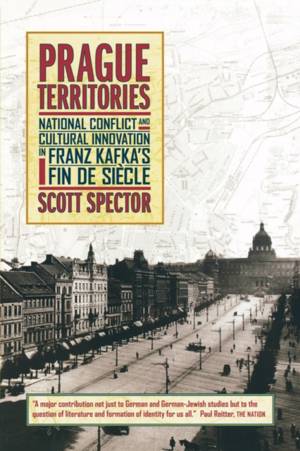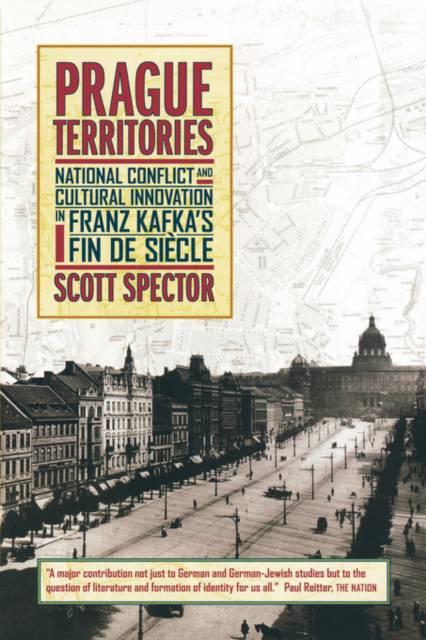
- Retrait gratuit dans votre magasin Club
- 7.000.000 titres dans notre catalogue
- Payer en toute sécurité
- Toujours un magasin près de chez vous
- Retrait gratuit dans votre magasin Club
- 7.000.0000 titres dans notre catalogue
- Payer en toute sécurité
- Toujours un magasin près de chez vous
Prague Territories
National Conflict and Cultural Innovation in Franz Kafka's Fin de Siecle
Scott Spector
62,95 €
+ 125 points
Description
Scott Spector's adventurous cultural history maps for the first time the "territories" carved out by German-Jewish intellectuals living in Prague at the dawn of the twentieth century. Spector explores the social, cultural, and ideological contexts in which Franz Kafka and his contemporaries flourished, revealing previously unseen relationships between politics and culture. His incisive readings of a broad array of German writers feature the work of Kafka and the so-called "Prague circle" and encompass journalism, political theory, Zionism, and translation as well as literary program and practice.
With the collapse of German-liberal cultural and political power in the late-nineteenth-century Habsburg Empire, Prague's bourgeois Jews found themselves squeezed between a growing Czech national movement on the one hand and a racial rather than cultural conception of Germanness on the other. Displaced from the central social and cultural position they had come to occupy, the members of the "postliberal" Kafka generation were dazzlingly productive and original, far out of proportion to their numbers. Seeking a relationship between ideological crisis and cultural innovation, Spector observes the emergence of new forms of territoriality.
He identifies three fundamental areas of cultural inventiveness related to this Prague circle's political and cultural dilemma. One was Expressionism, a revolt against all limits and boundaries, the second was a spiritual form of Zionism incorporating a novel approach to Jewish identity that seems to have been at odds with the pragmatic establishment of a Jewish state, and the third was a sort of cultural no-man's-land in which translation and mediation took the place of "territory." Spector's investigation of these areas shows that the intensely particular, idiosyncratic experience of German-speaking Jews in Prague allows access to much broader and more general conditions of modernity. Combining theoretical sophistication with a refreshingly original and readable style, Prague Territories illuminates some early signs of a contemporary crisis from which we have not yet emerged.
With the collapse of German-liberal cultural and political power in the late-nineteenth-century Habsburg Empire, Prague's bourgeois Jews found themselves squeezed between a growing Czech national movement on the one hand and a racial rather than cultural conception of Germanness on the other. Displaced from the central social and cultural position they had come to occupy, the members of the "postliberal" Kafka generation were dazzlingly productive and original, far out of proportion to their numbers. Seeking a relationship between ideological crisis and cultural innovation, Spector observes the emergence of new forms of territoriality.
He identifies three fundamental areas of cultural inventiveness related to this Prague circle's political and cultural dilemma. One was Expressionism, a revolt against all limits and boundaries, the second was a spiritual form of Zionism incorporating a novel approach to Jewish identity that seems to have been at odds with the pragmatic establishment of a Jewish state, and the third was a sort of cultural no-man's-land in which translation and mediation took the place of "territory." Spector's investigation of these areas shows that the intensely particular, idiosyncratic experience of German-speaking Jews in Prague allows access to much broader and more general conditions of modernity. Combining theoretical sophistication with a refreshingly original and readable style, Prague Territories illuminates some early signs of a contemporary crisis from which we have not yet emerged.
Spécifications
Parties prenantes
- Auteur(s) :
- Editeur:
Contenu
- Nombre de pages :
- 345
- Langue:
- Anglais
- Collection :
- Tome:
- n° 21
Caractéristiques
- EAN:
- 9780520236929
- Date de parution :
- 01-08-02
- Format:
- Livre broché
- Format numérique:
- Trade paperback (VS)
- Dimensions :
- 154 mm x 228 mm
- Poids :
- 594 g

Les avis
Nous publions uniquement les avis qui respectent les conditions requises. Consultez nos conditions pour les avis.






